Meet Ash Fischer and Orlando Hayes, a pair behind not one but two brands looking at new ways of making materials sustainable.

Orlando Hayes and Ash Fischer.
September 25th, 2024
Behind the Brand is about getting to know the real design enthusiasts who work just outside the spotlight across our industry. We hear lots from the architects and interior designers, but what about the sales managers and marketing experts who link them with products, specifiers and so on? This time, we hear from Ash Fischer and Orlando Hayes, founders of Fisch Designs and ditto, respectively.

Indesignlive: When and why did you each found Fisch Designs and ditto?
Ash Fischer: I founded Fisch Designs in 2020, an innovative, multi-disciplinary design studio that blends aesthetic appeal with a deep commitment to environmental sustainability. Through my brand I aim to challenge conventional perceptions of materials, reshaping them within the context of contemporary design.
Orlando Hayes: I founded ditto in 2022, a design project that originally used 3D scanning to mimic and reproduce human form. My passion for environmental science began when I was young. I grew up in the coastal town of Thirroul, NSW, where I was surrounded by diverse ecological environments. I developed a deep connection to nature, which led me to study ecology at the University of New South Wales. With a keen interest in applying ecological principles to built environments, I began working as a sustainability and environmental consultant at ARUP Sydney in 2019.
Whilst working within the sustainability industry, I met Amanda Sturgeon, a pioneer in the biophilic design era. Amanda encouraged me to bring ecology and environmental practice into the thinking of other disciplines, exploring the integration of wider ecological and human systems, interspecies design, and the depth of material selections in design. This ultimately motivated me to start ditto.

Ash, what is your background in design?
Ash Fischer: My passion for design was ignited during my formative years. I studied Design and Technology throughout high school, and went on to briefly study at Enmore TAFE, majoring in Interior Design. Shortly after, I moved to Melbourne to pursue Furniture Design at RMIT. It was here that my passion for design truly flourished. Often escaping to Smith Street Bazaar, I was captivated by iconic vintage furnishings, and planned to one day evoke a similar sense of wonder through my own work. This inspiration culminated into my final graduating piece, the Lucha Lamp.
What started as a university project quickly grew into something more. I began crafting the Lucha Lamp from sanded-down, spray-painted PVC elbows – a bold, unconventional choice that resonated with design enthusiasts. By the end of 2020, I sold nearly 100 variations of the lamp, making it my most successful design to date. Its appeal was further amplified when shared by Australian internet sensation, Flex Mami, who boasts over 180,000 followers.
From here, Fisch Designs was born, which offers a curated range of pieces inspired by the giddy optimism of the retro-futuristic aesthetic, a period of design influenced by the space race of the 1960s. The initial collection includes the Lucha Lamp, a playful table lamp available in four vibrant colours; the Ironica Ashtray, an ironic creation made from recycled vapes; and the Gummy Mirror L, a translucent mirror with a unique yet familiar style. In 2022, the floor version of the Lucha Lamp was acquired by the National Gallery of Victoria (NGV).

Orlando, you studied ecology – how did you find yourself working in design and how does it relate to ecology for you?
After spending six years working within the corporate sustainability landscape, I was excited and eager to undertake more tangible design work. Having advised governments, businesses and organisations on ideas and concepts of environmentalism, I felt the need to apply and actualise some of these into more tangible projects.
I have discovered that design is a very nourishing balance between intent and art. I often consider this when designing and exploring what good design means as an ecologist and environmentalist. I am hoping to further showcase new ways of thinking about materials, manufacturing and design. I not only want to design beautiful objects, but also use them as a means of connecting people with their local place. I believe good design is as much about the story of its creation as it is about the physicality.
Unfortunately, I feel that sustainability itself has become a washed-out term that is applied to anything remotely related to reducing impacts on our environment. I hope to instead bring excitement and engagement back to the idea of sustainable design through my own work and those created in collaboration with Ash.

How did your collaboration come about?
Ash Fischer: Whilst launching ditto and working remotely for Ch4 Global, Orlando moved into the same creative space as myself. I immediately recognised Orlando’s expertise in environmental design, eventually approaching him for assistance with the design of the Camada Daybed.
After working together for several weeks, I discovered we had a natural balance and synchronicity. We spent the next 8 months transforming the Camada Daybed from a simple idea to producing the first ever prototype with DEFY. Finalised in 2023, the Camada Daybed exemplifies our shared vision of reimagining material possibilities within contemporary design. The design features sheets of recycled plastic layered on a horizontal plane, a departure from traditional recycled plastic techniques like kerf bending and cross joins.
This marked a turning point in my commitment to environmentally conscious design. Fisch Designs now stands at the intersection of style and substance, with a strong emphasis on sustainability.


What has worked well so far and what have you learned from working together?
Ash Fischer: Orlando’s expertise as an environmental scientist played a significant role in strengthening my understanding of sustainable materials and consideration of the broader impacts of design, including manufacturing and travel emissions. This knowledge ultimately drove the design of the Camada Daybed, which utilises recycled plastics – a material that allows for intricate manipulation while effectively repurposing one of the world’s most wasted resources.
Orlando and I were named as the recipients of the 2023 Carl Nielsen Design Accelerator program for our Camada Daybed design. I truly believe that without the guidance and expertise of one another, we would not have been able to achieve such an outstanding design that places sustainability at its core. Receiving this award was a significant milestone in our career. Being emerging designers can often require constant self-investment and persistence in a challenging industry. Programs like the Carl Nielsen Design Accelerator have been crucial in advancing our careers.
Orlando Hayes: Whilst working alongside Ash, I have learnt so much about design and found immense joy in creating something meaningful. I believe we have found balances in each other and have an innate ability to challenge the other’s way of thinking. Collaborating with Ash broadened my design perspective, particularly in exploring how the precision of Industrial Revolution-era manufacturing can be harmonised with the intimacy and innovation of contemporary design.

What future plans do you have together? Any exciting work in the pipeline?
Ash Fischer: Looking into the future, Orlando and I are committed to continuing our exploration of sustainable materials and practices. With greater awareness of the impact of materials on the planet and ecosystems, we are investigating new materials developed from waste and biodegradable polymers, such as seaweed, bio-resin, hemp and clay. New materials take time to perforate into the industry, and we want to fast track this process by providing examples of new designs that use these materials yet stand alone as beautiful pieces of design.
Our ethos is to redefine what it means to create beauty with responsibility, pushing the boundaries of contemporary Australian design. Although, we made great progress with the Camada Daybed, we want to recognise and take ownership of its environmental flaws. We are looking to further improve our design, whilst also working with manufacturers to shift towards practices that don’t contribute to the global climate crisis.
We would also love to create our first furniture collection that expands upon the design of the Camada Daybed to also feature a stool and coffee table. Each design will utilise the ingenious layering system that excludes the need for screws, nails, or adhesive by using a unique pinning system. All made from 100 per cent recycled plastic, the base piece and legs will be held together through the compression of the user’s weight.
Together, Orlando and I will continue to steer Fisch Designs toward new heights, setting industry standards for the seamless integration of aesthetics and sustainability.
Fisch Designs
fisch.com.au








INDESIGN is on instagram
Follow @indesignlive
A searchable and comprehensive guide for specifying leading products and their suppliers
Keep up to date with the latest and greatest from our industry BFF's!
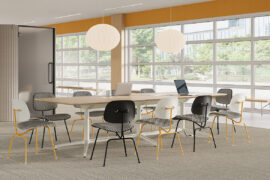
Herman Miller’s reintroduction of the Eames Moulded Plastic Dining Chair balances environmental responsibility with an enduring commitment to continuous material innovation.
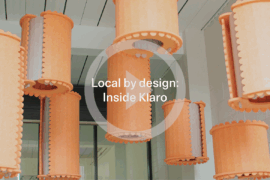
In an industry where design intent is often diluted by value management and procurement pressures, Klaro Industrial Design positions manufacturing as a creative ally – allowing commercial interior designers to deliver unique pieces aligned to the project’s original vision.
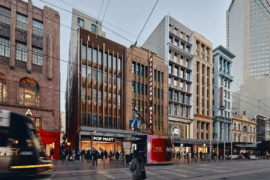
Merging two hotel identities in one landmark development, Hotel Indigo and Holiday Inn Little Collins capture the spirit of Melbourne through Buchan’s narrative-driven design – elevated by GROHE’s signature craftsmanship.
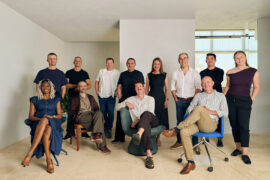
Following the merger of Architex (NSW) and Crosier Scott Architects (VIC), Cley Studio re-emerges as a 50-strong national practice delivering more than $600 million in projects across Australia.
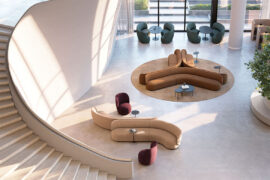
Stylecraft’s Hélice Collection by Keith Melbourne offers unprecedented versatility in modular seating systems for contemporary commercial environments whilst celebrating local Australian design and manufacturing
The internet never sleeps! Here's the stuff you might have missed
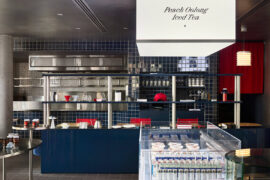
Suupaa in Cremorne reimagines the Japanese konbini as a fast-casual café, blending retail, dining and precise design by IF Architecture.
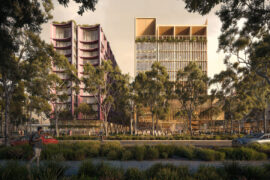
The master plan and reference design for Bradfield City’s First Land Release has been unveiled, positioning the precinct as a sustainable, mixed-use gateway shaped by Country, community and long-term urban ambition.